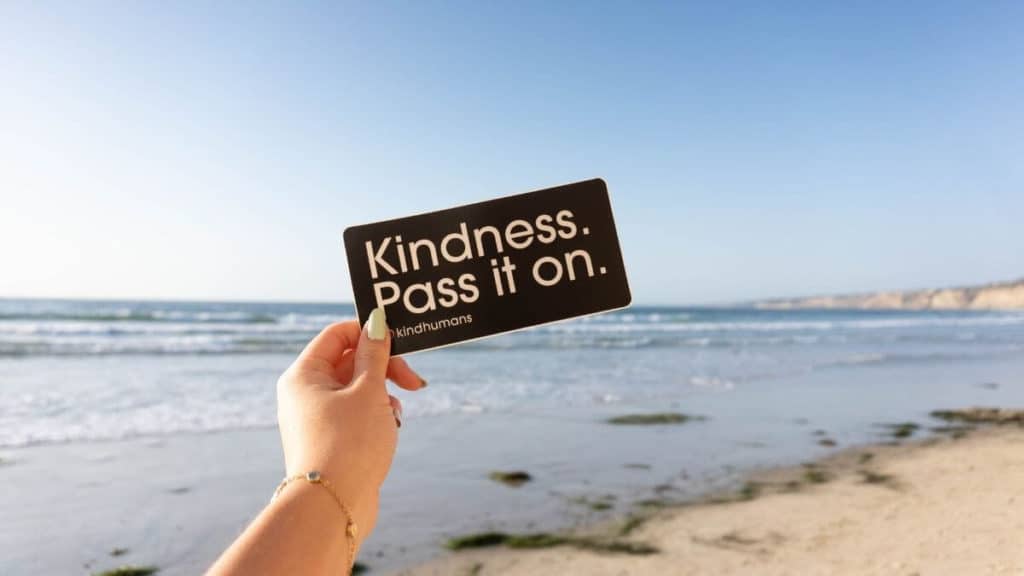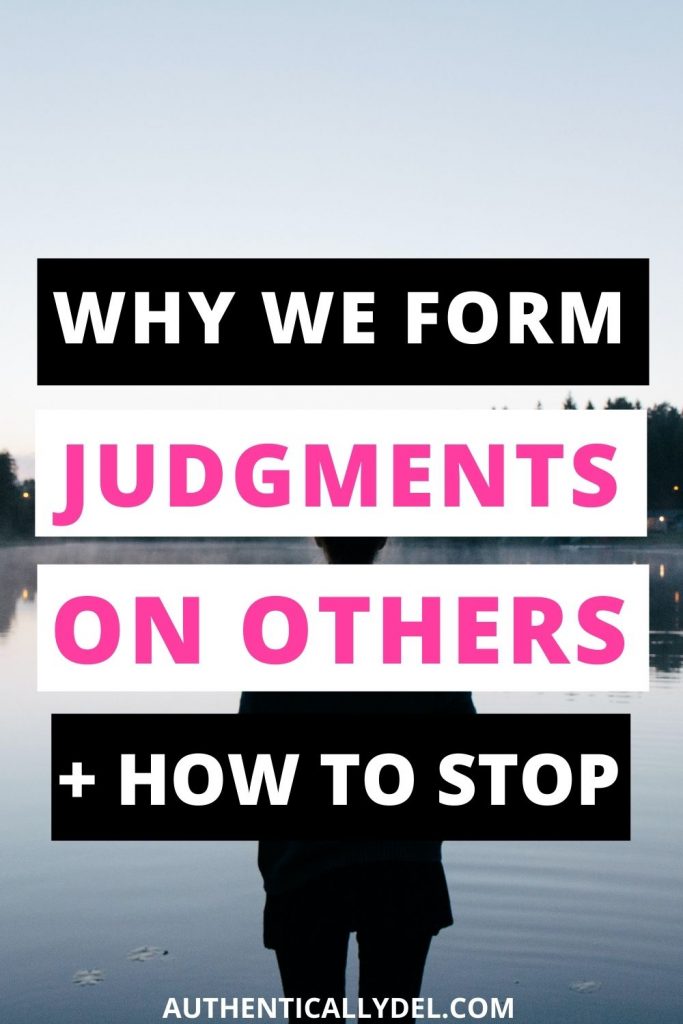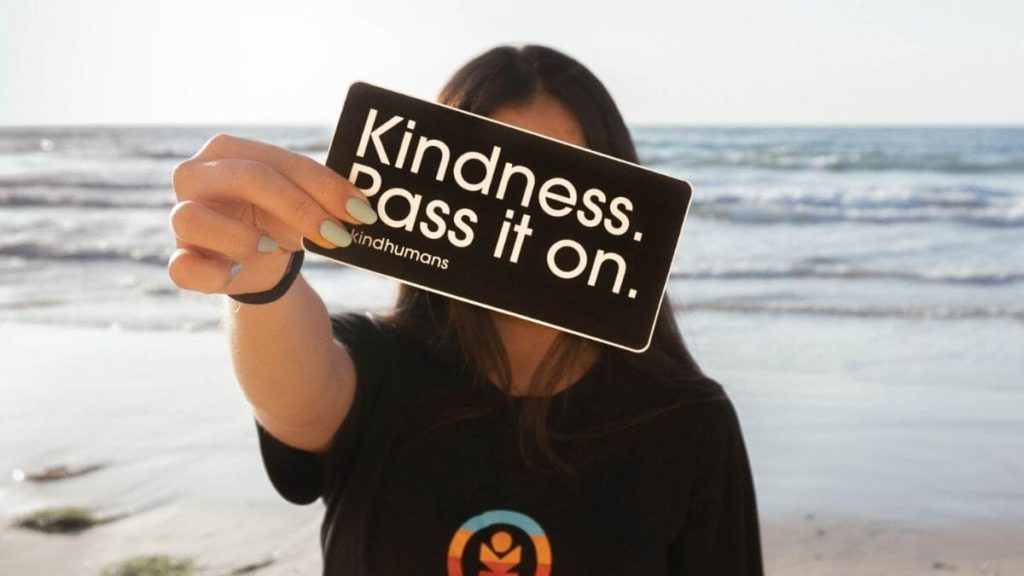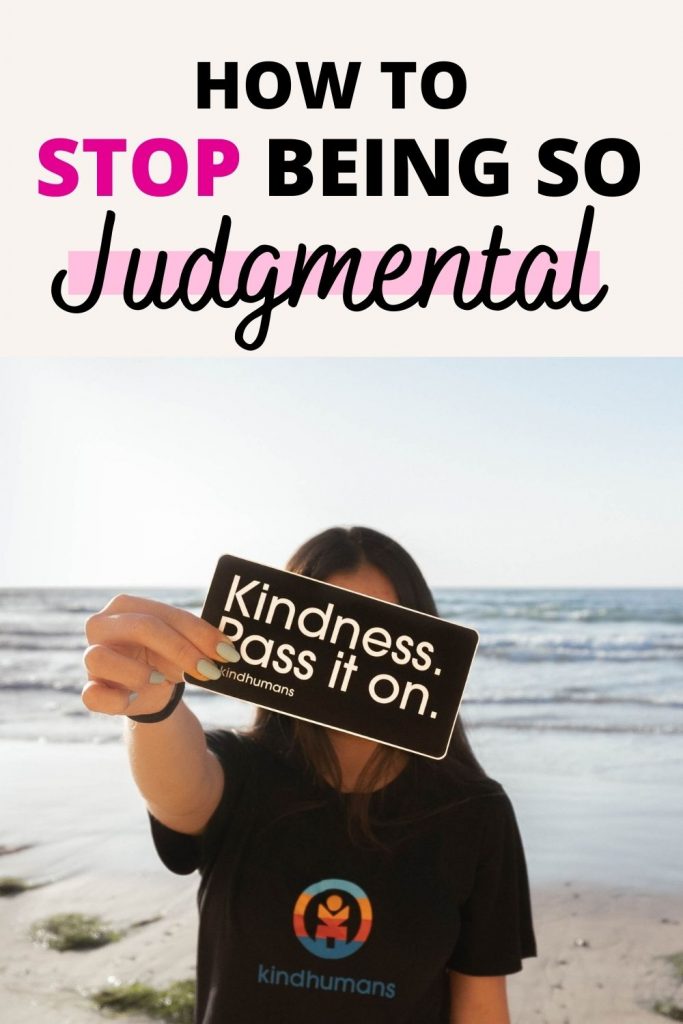This post may contain affiliate links meaning that, I may make commission if you purchase through my links. Learn More.
Judging people is something we are all guilty of. At one point or another, we have all passed judgment on someone around us.
Let’s uncover why we judge people, what judging people says about us, and how we can work to stop judging people.

It’s time to be honest with yourself. How often do you judge people?
My bet is that you pass some sort of judgment on others at least every day. Most likely, you are judging others multiple times a day.
If this is you, don’t click out of here in shame… you are not alone in this. As humans, it is actually very natural to judge others. Whether it be a friend, family member, or a random stranger in the grocery store, our brains are passing judgment on others all the time.
The truth is, we have all judged… and we have all been judged.
As we go throughout our everyday lives, judging people is a way for us to reveal our own internal thoughts, feelings, biases, emotions, and struggles. Because of this, the way we judge others says way more about us than it does them.
Let’s unpack the truth about judging people a little bit more.
Why We Judge People
When we judge people, chances are that it is because of one of these five reasons.
1. Judging Others Because of Insecurities
When we pass judgment on somebody else, chances are good that we are judging something that we are hyperaware of in ourselves. Our own insecurities are reflected in the way we judge other people.
For example, when I was the most insecure about my body, I was hyperfocused on the body shapes and sizes of those around me. Whether my judgments were positive or negative, I noticed that nearly all of my immediate judgments of others regarded their body.
These judgments were hard for me to accept… I knew it was wrong to judge other people’s bodies. In fact, I hated that the thoughts would come up at all.
But it wasn’t until I focused on healing my own body insecurities that I began judging people less.
Every judgment made was a direct reflection of myself and said absolutely nothing about the person being judged.
2. Judging Others Because of Fear
Another reason we may be judging people is because of a deep fear within ourselves.
I read a story about a woman that came from a long past of financial insecurity. She grew up poor and struggled with money in her adult life.
After landing a high-paying job, her financial issues lessened to almost nothing. However, she found herself judging other people’s income or financial status.
If she saw someone in an old or beat-up car, she would judge. When she saw someone dressed in what she perceived as “poor clothing”, she would judge.
She recognized that these judgments really had nothing to do with the individuals being judged. Deep down, these judgments were a reflection of her fears.
She was deeply afraid of falling back into that place of financial struggle. Because of that, she subconsciously judged anyone that she felt represented that deep internal fear.
If you find yourself judging people for things you perceive as unpleasant, that may be an indicator that you are judging out of fear. It has nothing to do with them, only you and your own internal anxieties.
3. Judging Others Because of Habit
When we do something over and over again it becomes a habit. Judging people is no exception.
If we are consistently judging those around us, before we know it, it’s a habit that we just cannot break. We see someone and our brain automatically shoots us a snap judgment (because that is what it’s used to doing!).
Even if your judgments of others are initially fueled by another reason (ie. insecurity or fear), after a while, judging other people becomes second nature to you. It is now a habit – which means you will have to actively work to break it if you want to see it change.
4. Judging Others Because of Social Pressures
Social pressures and social constructs of all sorts seep into our minds and impact the way we view others. Oftentimes, judging people is a reflection of the things we have been taught to believe are true.
Social constructs, roles, norms, and pressures are everywhere. They impact the way we view our world and the people around us – oftentimes unfairly.
Gender, class, race, sexuality, age, and ability are all examples of social constructs. This means that all of these “categories” of people have been given a meaning that is expected to be believed to be true for all people.
For example, society has created and enforced gender roles. Within this construct, it is believed that wearing a dress and having painted nails is a feminine trait. Because of that taught and reinforced idea, seeing a man wearing a dress and pink nail polish may evoke an instant judgment in you. This judgment is the result of a challenge to a social construct you’ve been taught.
This can occur in all areas of life.
Let’s look at another example. Oftentimes people in larger bodies are believed to be “unhealthy“. Therefore, you may make a judgment that a larger-bodied person is “unhealthy” because of this idea that is reinforced in society and media.
That judgment may not be true at all, yet the judgment comes up as a result of our taught social beliefs and behaviors.
Be aware of these internalized social pressures that affect the way you view and judge the people around you.
5. Judging Others Because of Human Nature
It seems impossible to ignore the obvious… judging others is natural human behavior. A Harvard psychology study confirmed that judgment is our natural instinct as humans.
Some neurobiologists call judgments a defensive mechanism. They explain that, through judgments, our brain is able to send us the “stay away!” signals when we recognize something we don’t like.
Understanding judgments as a natural human instinct is important. This helps to combat the shame surrounding the judgments you make.
Judging people does not inherently make you a bad person.
However, your judgments can be harmful. It is ultimately your responsibility to keep your judgments in check. There are some things you can do to combat harmful judgments.

Is Judging People a Bad Thing?
As we know, judging is a natural human response. We all do it in one way or another.
That said, judging people can be harmful – to you and the person you are judging.
How Judging People Affects You
When you continually pass harsh, negative judgments on others, you tend to feel worse yourself. Whether you notice it or not, judging people typically evokes a negative emotion in yourself.
If the judgment is negative, you may experience the negative effects of disgust, pessimism, or cynicism.
On the other hand, if your judgments relate to something you view as positive, feelings of envy, jealousy, insecurity, or bitterness may come up.
Additionally, judging people has been found to be harmful to your own health.
Being a judgmental person is linked to increased stress, anxiety, negativity, and loneliness (as being judgemental tends to make people shy away from you).
Regardless of the judgment being made, judgments commonly negatively impact your own internal mental state.
How Judging People Affects Them
Judging other people can also be harmful to those you are judging.
Let’s be honest. It does not feel good to be judged by others. No matter who they are (family, friend, or stranger), when we feel judged by someone else, it takes a toll on our own self-perception and self-esteem.
We’ve all been in a situation where we have felt judged and, as a result, began questioning ourselves.
Imagine this: You are wearing out a new pair of shoes that you LOVE. They’re a bit unique, but you like them. While you are out running errands, you notice someone giving you the full up-and-down, focusing ultimately on your shoes. Now, suddenly, you question your shoe choice. You no longer feel confident after a stranger’s perceived negative judgment of your shoes.
No matter how confident we are, it just doesn’t feel good to be judged.
If you are the one judging people, the effects can be hurtful. Keep this in mind when you are out and about, passing judgment on those around you.
Your judgments have the ability to hurt feelings, dwindle self-confidence, and emotionally harm others. Judging people holds power.
How Judging People Affects Society
Judgments are a way to perpetuate stereotypes and harmful social norms, perceptions, and beliefs. Additionally, judging others tends to push them away, causing an ever-widening divide between people.
As a whole, judgments on others are most commonly harmful to all.
At the end of the day, if another person’s lifestyle, appearance, clothing, possessions, etc. do not directly affect you, your judgment is not necessary.
If you choose to pass judgment anyways, nobody wins. The judger, the judged, and the world around them are all negatively impacted.
8 Tips to Stop Judging People
To some extent, we know that judging people is a natural human response. As bad as it sounds, we all do it from time to time. But there are certain ways you can limit your judgments and minimize the harm of them – for both yourself and those around you.
1. Tackle Your Own Insecurities
As we talked about earlier, the majority of our harsh judgments really stem from our own internal insecurities. By tackling your insecurities head-on, you will naturally start to notice those things less in other people.
This is something I have experienced firsthand.
Journaling for self-love, working through deep self-reflection, and pursuing talk therapy can be great tools for working through your own insecurities.
(Use this link with the code APPLY65 for $65 off your first month of online therapy!)
Freeing yourself from your insecurities will not only help control your judgments but will release you from negative self-talk and allow you to live a happier, more fulfilled life as a whole. Everyone wins.
2. Be Aware of Your Judgments
Actively notice your judgments when they come up. Be consciously on the lookout for those pesky mental judgments that pop into your head throughout the day. By even just being more aware of them, you can start to minimize them.
Acknowledgment is the first step in change.
3. Counter Each Judgment
If you are practicing #2, you can start incorporating this step next to stop judging people. When you acknowledge a judgment, consciously take a moment to counter it in your mind.
For example:
Judgment Thought: “That shirt looks so silly on her.”
Counter Thought: “She looks really confident. I hope she’s having a good day.”
These might feel silly at first, but it’s a great way to start retraining your mindset. Actively replace all your negative judgments with a positive thought, no matter how big or small.
4. Educate Yourself Before Judging
The majority of the time, our judgments come from a place of misinformation or a lack of information.
How many times have you formed a hasty judgment about a total stranger?
Probably a lot. I’ve done it too!
Challenge yourself to be educated before making any judgments. For example, say you make a judgment that someone is inconsiderate because they are blocking the aisle in the grocery store. Perhaps they are distracted by a family crisis. Or maybe they simply didn’t notice you were there!
Judgments usually stem from misconceptions. While it’s not possible to know everyone’s full life story, try to give people the benefit of the doubt.
Think of all the possible background information that is missing from your judgment. This helps to realize how unfair and inaccurate your judgment may be.
5. Imagine Yourself in Their Position
Before passing judgment on others, think about how it would feel in return. We have all experienced unfair judgment before at one time or another. Remember how that makes you feel. Have empathy. Choose to not make another person feel the negative effects of unnecessary judgment.
6. Diversify Your Social Circle
Oftentimes, judgments come up for things that seem unusual or out of the ordinary. We through around the term “weird” as a form of judgment for someone or something that feels unnatural to us.
But who says the thing in question is “weird” at all?
Just because you are not used to something does not mean that it is wrong or in need of critique.
In fact, this judgment says more about you. This may be a sign that you need to diversify your life in one way or another.
For example, a “weird” fashion statement to you may just mean that you have not experienced it before. That is a you-problem that says nothing about the other person.
It takes all kinds of people in this world. Open your mind to different opinions, people, lifestyles, appearances, and beliefs. An open mind is a judgment-free zone.
7. Practice Kindness Always
Even if judgments come up, it is up to you to remain kind. Kindness always wins.
Remaining kind, even in the wake of judgment, can minimize the negative impacts of judging people. If you keep the judgments entirely to yourself, you do not spread any negativity to those around you.
While the judgments may still evoke negativity inside yourself, you are not responsible for spreading it. Then, at that point, judging people impacts you. Since your judgments are more about you than anyone else anyways, that seems fair.
8. Break the Habit
At the end of the day, if judging people has become a habit for you, you are going to have to work to break it. This means that it will likely take some time and conscious effort to learn how to judge people less.
Pay close attention to your judgments.
Recognize them when they come up and actively combat them. Use the 7 steps listed prior to really work on breaking your judgmental habits.
Evidence suggests that it can take anywhere from 19-254 days to break a habit. That is a huge variable difference there. So, if you are not seeing immediate results when trying to break this habit, stick with it. It takes time to break a habit, especially if it has been ingrained for years.

A Final Note on Judging People
Remember that judging people does not make you a bad person.
To be honest, if you are here reading about how to stop judging people, I’m willing to bet you’re a pretty good person.
We’re all human and we all have room to grow.
The fact that you are recognizing your judgmental tendencies and wanting to work on them is amazing.
Keep with that mindset and continue to pursue positive growth and change. The world could use more people like you!

Leave a Reply